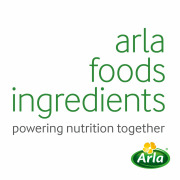News
Arla intros 'optimized comfort' infant formula concept
11 Jan 2019Optimized comfort is at the heart of a new whey protein-based concept for infant formula developed by Arla Foods Ingredients which alters the amount and types of proteins in formula.

Optimized comfort is at the heart of a new whey protein-based concept for infant formula developed by Arla Foods Ingredients.
Infant formulas contain significantly more protein than human milk, the company notes and, since protein is hard to digest, this can lead to gastrointestinal discomfort issues in infants, such as colic and constipation, resulting in excessive crying. Other problems are said to include regurgitation and stool issues. However, by altering the amount and types of proteins in formula, Arla believes it is possible to reduce these problems.Arla Foods Ingredients’ new optimized comfort concept for infant formula contains alpha-lactalbumin, which is the most abundant protein in human milk. Due to its excellent amino acid composition, alpha-lactalbumin is a high-quality protein that is a key ingredient in low-protein formulas with protein levels closer to human milk.The new concept also includes whey protein hydrolysates, which are high-quality proteins that have been broken down by enzymes, effectively meaning they have been pre-digested.Arla Foods Ingredients says it is the world’s first commercial producer of alpha-lactalbumin and one of the world’s largest producers of both alpha-lactalbumin and whey protein hydrolysates. Its infant nutrition ingredients are manufactured in Denmark using milk that is non-GMO/GMO-free, Kosher and Halal-certified, and free of annatto.The new optimized comfort, low protein formula concept incorporates Lacprodan ALPHA-10, a whey protein concentrate with a minimum level of 41% alpha-lactalbumin as a proportion of total protein content; and Lacprodan IF-3070, a partially hydrolysed whey protein (DH 9-15) with a mixture of small and larger peptides.The concept product has been created to showcase potential optimized comfort applications. It contains 9.7g of protein per 100g serving and has a protein to energy ratio of 1.9g/100kcal.Gut comfort is generally considered to be important for infant well-being and sleep, Arla says, and discomfort can be emotionally and physically draining for both infants and parents. Furthermore, the company notes that infant discomfort problems are the most common reason for parents to switch between formulas to find a solution to their infant’s gastrointestinal issues. The number of global launches of infant formula products with on-pack messages relating to comfort has risen by a CAGR of 11.6% over the past five years.Related news

Retail landscape lacks nutritious and affordable food, says ATNi
30 Dec 2025
A rapid increase in modern food retail has given retailers growing influence over consumer diets, according to global non-profit ATNi’s latest assessment.
Read more
Debate over ban on ‘meaty’ names for plant-based products reaches stalemate
26 Dec 2025
The debate over a ban on plant-based products using “meaty” terms has reached a stalemate, leaving manufacturers in limbo and still facing overhauls to their marketing and packaging.
Read more
Innovation promise in 'maturing' plant-based dairy alternatives market
8 Dec 2025
Plant-based dairy is a maturing market that still faces significant hurdles around taste, functionality, nutrition, and price, but industry is innovating fast, according to experts speaking at Fi Europe.
Read more
Celebrating the winners of the Fi Europe Innovation Awards 2025
3 Dec 2025
Food industry stakeholders celebrated as the winners of the Fi Europe Innovation Awards were announced at a ceremony in Paris.
Read more
Big appetite for M&A between European and US food and drink companies
3 Dec 2025
Persistent tariffs on EU food and beverage exports have helped drive record levels of M&A activity between European and US companies this year, according to analysis by ING.
Read more
Non-UPF Program extends certification scheme to entire food industry
30 Nov 2025
The Non-UPF Program has extended its certification scheme to the wider food sector, championing a move towards healthier consumption habits.
Read more
Empowering innovation in fortification and colouration
13 Nov 2025
Divi’s Nutraceuticals offers a large portfolio of innovative, high-quality ingredients for foods, beverages, and supplements, with bespoke solutions and expert support for product success.
Read more
Danone highlights digestive health as potential ‘tipping point’ for food industry
13 Nov 2025
Danone is betting on a food industry “tipping point” that will bloat the market for healthy products, particularly those related to gut health.
Read more
Standing Ovation and Bel scale up casein production from dairy co-products
11 Nov 2025
Foodtech company Standing Ovation has partnered with cheese specialist Bel Group to manufacture dairy serums for industrial-scale casein production via precision fermentation.
Read more
New UPF standard hoped to offer consumers ‘coherence and clarity’
10 Nov 2025
Ingredients companies are being urged to enter “a new era of partnership and innovation” following the launch of the industry’s first non-UPF verification scheme.
Read more
